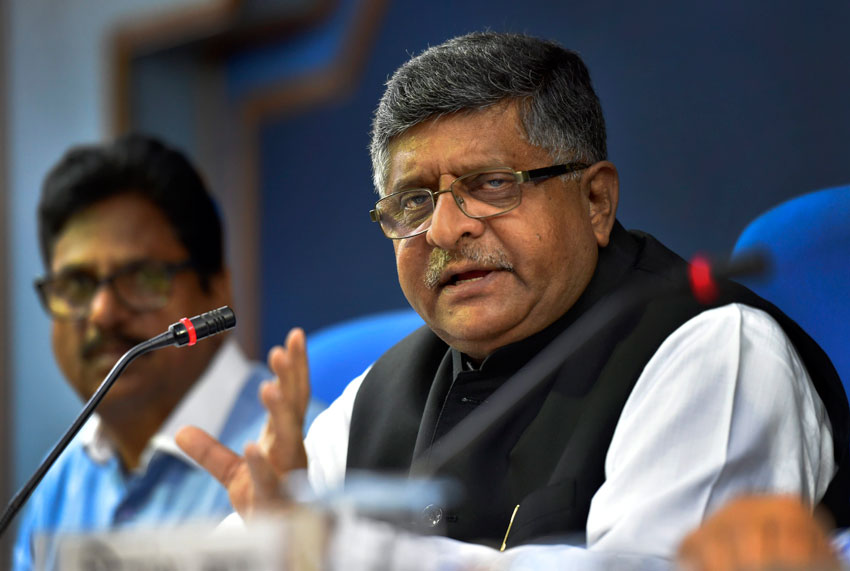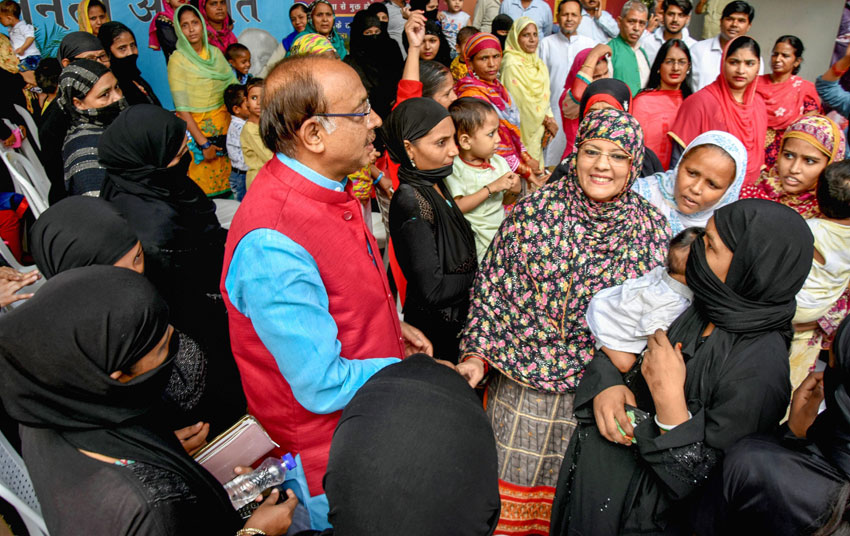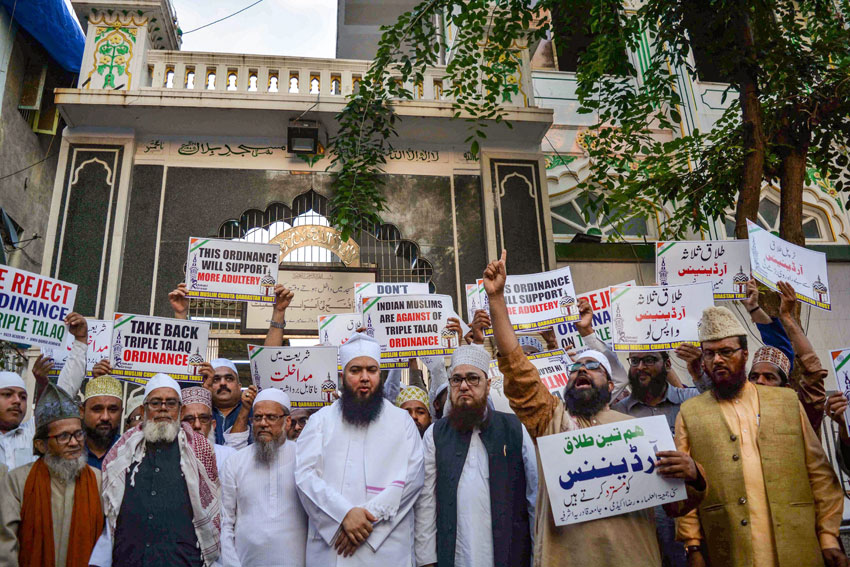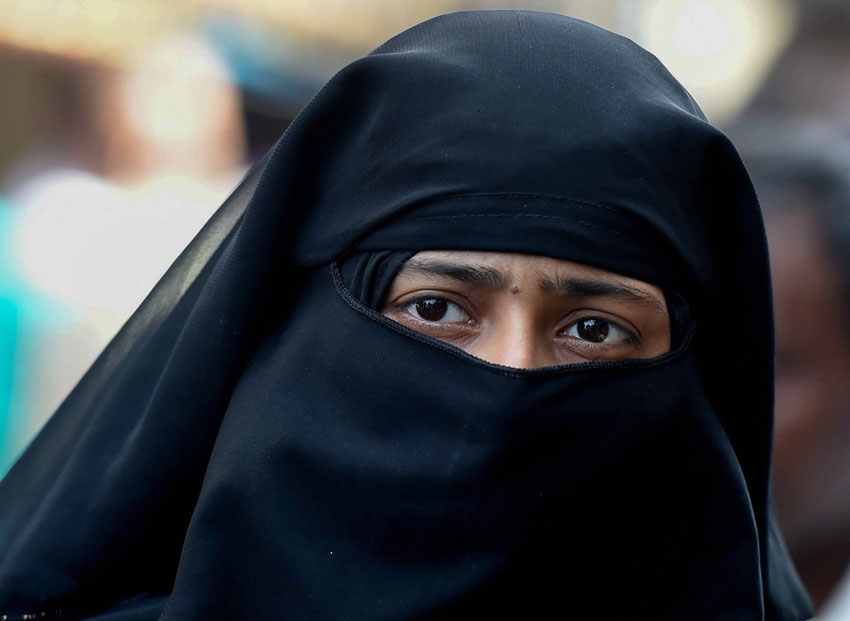Indian President Signs Ordinance to Make Instant Triple Talaq, A Penal Offense
A Muslim woman looks on, near Jama Masjid in New Delhi, Sept. 19. The Union Cabinet approved an ordinance to ban the practice of instant triple talaq. Under the proposed ordinance, giving instant triple talaq will be illegal, and void, and will attract a jail term of three years for the husband. (Atul Yadav/PTI)
President Ram Nath Kovind signed an ordinance banning the practice of instant triple talaq, Sept. 19, a top law ministry functionary said.
The Union Cabinet had approved the ordinance to ban instant triple talaq and make it a punishable offense, Sept. 19.
“Yes, the president has signed the ordinance,” the functionary said.
Law Minister Ravi Shankar Prasad had said there was an “overpowering urgency” to bring the measure as instances of this mode of divorce continued unabated despite the Supreme Court striking it down.
According to the ordinance, giving instant triple talaq has been made illegal and void, and will attract a jail term of three years for the husband.
Seeking to allay fears that the law could be misused, the government has included certain safeguards in it such as adding a provision of bail for the accused before trial.
These amendments were cleared by the Cabinet, Aug. 29.
“There was an overpowering urgency and a compelling necessity to bring the ordinance as the practice continued unabated despite the Supreme Court order last year,” Prasad told a press conference.

While the law makes instant triple talaq a “non-bailable” offence, an accused can approach a magistrate even before trial to seek bail. In a non-bailable offence, bail cannot be granted by police at the police station itself.
Prasad said a provision has been added to allow the magistrate to grant bail “after hearing the wife”.
Sources later said the magistrate would ensure that bail is granted only after the husband agrees to grant compensation to the wife as provided in the bill. The quantum of compensation will be decided by the magistrate, as per the bill.
The police would lodge an FIR only if approached by the victim (wife), her blood relations or people who become her relatives by virtue of her marriage. Neighbours and others cannot lodge a complaint under the proposed law.
The offence of instant triple talaq will be “compoundable”. Now, a magistrate can use his powers to settle the dispute between a husband and his wife. This will happen only when the wife approaches the court.
Under a compoundable offence, both parties have the liberty of withdrawing the case.
The proposed law would only be applicable on instant triple talaq or ‘talaq-e-biddat’ and it would give power to the victim to approach a magistrate seeking “subsistence allowance” for herself and minor children.
A woman can also seek the custody of her minor children from the magistrate who will take a final call on the issue.
Citing details of instant triple talaq cases, Prasad said till now 430 incidents of triple talaq have come to the notice of the government through the media. Of these, he said, 229 were reported before the Supreme Court judgement, while another 201 came to the notice after it.
These cases were reported between the period of January 2017 and September 13, 2018, he said.
“What is important is that the practice of triple talaq continues in spite of Supreme Court having annulled it and Lok Sabha having passed a bill which is pending in the Rajya Sabha. We have all the evidence and a series of papers in this regard,” he told reporters.

The law minister used the opportunity to attack the Congress, saying it is not supporting the bill pending in Rajya Sabha under “vote bank pressures”.
“It is my serious charge that Sonia Gandhi ji has maintained silence on the issue. She is silent… It has nothing to do with politics but gender justice and dignity,” he said.
He urged UPA chairperson Sonia Gandhi, BSP supremo Mayawati and TMC chief Mayawati to support the bill in the next session of Parliament for the sake of “gender justice, gender equality and gender dignity”.
Prasad said he has tried to take the cooperation of the Congress party along with other parties, and had met its senior leader Anand Sharma who said he would get back after talking to the party leadership.
“I had met him five to six times… We had sought cooperation,” he said, adding that there was no response from the main opposition party.
CPI-M Opposes Triple Talaq Ordinance, Says It’s ‘Undemocratic’

The CPI (M) Thursday termed the ordinance on triple talaq as an “undemocratic step,” saying it cannot be accepted and Parliament should adopt a revised legislation.
The party said the BJP has brought out the ordinance so as to serve its political interests.
The CPI (M) Politburo said the ordinance promulgated by the government is “uncalled for” and is motivated by considerations other than that of the welfare of Muslim women.
“The triple talaq bill is pending in the Rajya Sabha and requires a full discussion including reference to a select committee. The ordinance is an undemocratic step bypassing Parliament,” an official statement of the party said.
“The ordinance on triple talaq promulgated by the Centre is uncalled for and motivated by considerations other than that of the welfare of Muslim women. The triple talaq Bill is pending in the Rajya Sabha and requires a full discussion including reference to a select committee,” tweeted Sitaram Yachury, the party’s general secretary.
The triple talaq form of divorce has already been declared illegal by the Supreme Court.
The party added that legislation regarding this has made a civil wrong into a criminal offence with the prescription of maximum three years punishment.
Terming the ordinance as an ill-conceived measure, the party said it will not be of help to the affected women. It stressed for rectification of the bill, which according to the party has other flaws.


